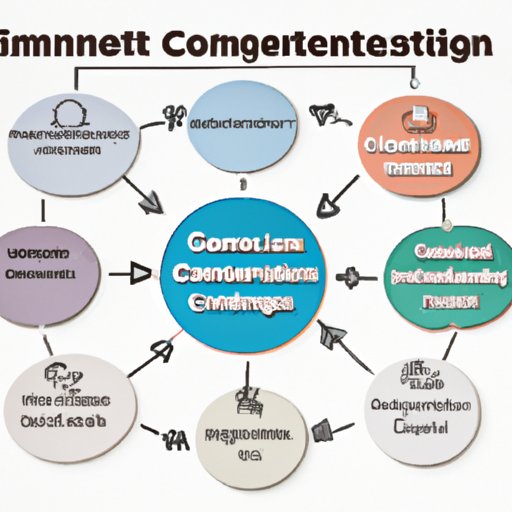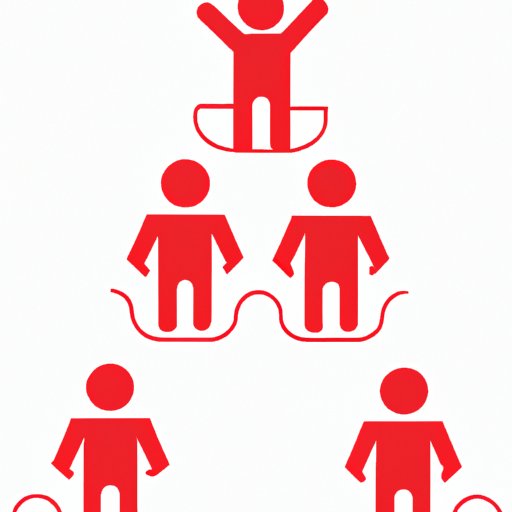Introduction
Communication is the exchange of information between two or more people. It is an essential part of any successful relationship, and it is especially important in leadership. Leaders need to be able to communicate effectively with their teams, stakeholders, and other people in order to be successful. In this article, we will explore why communication is important in leadership and provide tips on how to use communication strategies to enhance your leadership style.
Analyzing the Impact of Communication on Leadership Performance
Effective communication plays a vital role in successful leadership. It enables leaders to set clear goals and expectations, make sound decisions, manage difficult situations, and ultimately achieve organizational goals. Let’s take a closer look at each of these areas.
Understanding the Role of Communication in Setting Goals and Expectations
One of the most important roles of communication in leadership is setting goals and expectations. Leaders need to be able to clearly communicate their vision and objectives to their teams in order to ensure that everyone is on the same page and working towards the same goal. When expectations are clearly communicated, it helps to ensure that everyone is working together towards a common goal and that any potential conflicts are addressed in a timely manner.
Examining the Impact of Communication on Decision-Making
Another important role of communication in leadership is decision-making. Good communication skills enable leaders to listen to different perspectives and consider all of the available options before making a decision. Leaders also need to be able to effectively communicate their decisions to their teams in order to ensure that everyone understands and is on board with the decision. Effective communication can help to ensure that decisions are made in a timely and effective manner.
Exploring the Importance of Communication when Managing Difficult Situations
Leaders often have to manage difficult situations such as conflict, disagreement, and stress. In these situations, effective communication is essential in order to ensure that everyone involved is heard and respected. Good communication helps to ensure that any potential conflicts are addressed in a constructive manner and that solutions are found quickly and effectively.

Exploring the Role of Effective Communication in Achieving Organizational Goals
In addition to helping leaders set goals and manage difficult situations, effective communication is also essential for achieving organizational goals. Good communication can help to build trust among team members and foster collaboration. It can also help create a positive work environment and encourage team members to perform at their best.
Understanding How Effective Communication Can Help Build Trust
Good communication is key to building trust among team members. When team members feel like they can rely on one another and trust that their opinions and ideas will be respected, it helps to create a strong team dynamic. Good communication can also help to ensure that team members are working together towards a common goal.
Examining the Role of Communication in Developing Relationships
Effective communication is also essential for developing relationships with stakeholders. Leaders need to be able to communicate their vision and objectives in a clear and concise manner in order to ensure that stakeholders understand and are on board with the objectives. Good communication can also help to build relationships and foster collaboration between stakeholders.
Exploring How Effective Communication Can Help Create a Positive Work Environment
Effective communication can also help to create a positive work environment. When team members feel like their opinions are respected and their ideas are valued, it can help to create a more productive and harmonious work environment. Good communication can also help to avoid misunderstandings and conflicts, which can lead to a more efficient and effective workplace.

Examining the Benefits of Clear Communication for Building a Strong Team
Clear communication is essential for building a strong and cohesive team. Clear communication helps to ensure that everyone is on the same page and working towards the same goal. It also helps to foster collaboration and avoid misunderstandings, which can lead to improved team performance.
Understanding the Importance of Clear Communication for Team Members
Clear communication is essential for team members. When team members understand the tasks they are expected to complete and the goals they are working towards, they can work more efficiently and effectively. Additionally, clear communication helps to ensure that team members feel comfortable communicating their ideas and concerns, which can lead to better collaboration and problem-solving.
Examining How Clear Communication Can Help Foster Collaboration
Clear communication can also help to foster collaboration among team members. When team members feel like their ideas are respected and appreciated, they are more likely to share their ideas and offer their input. This can lead to better problem-solving and improved team performance.
Exploring How Clear Communication Can Help Avoid Misunderstandings
Clear communication can also help to avoid misunderstandings. When team members understand each other’s roles and responsibilities, it can help to ensure that everyone is working towards the same goal and that any potential conflicts are addressed in a timely manner. This can lead to a more productive and harmonious work environment.

Examining the Benefits of Communication Skills for Leaders and Managers
Communication skills are essential for both leaders and managers. Good communication skills can help leaders motivate their teams and managers better manage conflicts. They can also help leaders build stronger relationships with stakeholders.
Understanding How Communication Skills Can Help Leaders Motivate Their Teams
Good communication skills can help leaders motivate their teams. When leaders can effectively communicate their vision and objectives to their teams, it can help to ensure that everyone is on the same page and working towards the same goal. Good communication skills can also help to foster collaboration and create a positive work environment, which can help to motivate team members.
Examining How Communication Skills Can Help Managers Better Manage Conflicts
Good communication skills can also help managers better manage conflicts. When managers are able to effectively communicate their expectations, it can help to ensure that everyone is on the same page and that any potential conflicts are addressed in a timely manner. Good communication can also help managers to understand different perspectives and come up with creative solutions to any conflicts that may arise.
Exploring How Communication Skills Can Help Leaders Build Stronger Relationships with Stakeholders
Good communication skills can also help leaders build stronger relationships with stakeholders. When leaders can effectively communicate their vision and objectives to stakeholders, it can help to ensure that everyone is on the same page and that any potential conflicts are addressed in a timely manner. Good communication can also help to build trust and foster collaboration between stakeholders.
How to Use Communication Strategies to Enhance Your Leadership Style
Now that you understand the importance of communication in leadership, let’s take a look at some communication strategies that you can use to enhance your leadership style.
Exploring Different Types of Communication Strategies
There are many different types of communication strategies that you can use to enhance your leadership style. Some examples include active listening, questioning, storytelling, and empathy. Each of these strategies can help you to better understand your team members and foster collaboration.
Understanding How to Tailor Your Communication Style to Different Situations
It is important to remember that different situations require different types of communication strategies. It is important to tailor your communication style to different situations in order to ensure that you are using the most effective communication strategy for the given situation.
Examining How to Use Communication to Create a Culture of Accountability
Finally, it is important to use communication to create a culture of accountability. When team members understand their roles and responsibilities, they are more likely to take ownership of their tasks and hold themselves accountable for their performance. Good communication can help to ensure that team members feel comfortable speaking up and offering their ideas and suggestions.
Conclusion
In conclusion, effective communication is essential for successful leadership. Good communication can help leaders set goals and expectations, make sound decisions, manage difficult situations, and ultimately achieve organizational goals. It can also help to build trust, develop relationships, create a positive work environment, and foster collaboration. Furthermore, effective communication can help leaders motivate their teams, better manage conflicts, and build stronger relationships with stakeholders. Finally, it is important to tailor your communication style to different situations in order to ensure that you are using the most effective communication strategies.
By understanding the importance of communication in leadership and utilizing the right communication strategies, leaders can enhance their leadership style and improve their performance. It is essential for leaders to prioritize communication in order to ensure that their teams are working together effectively and that they are achieving their goals.
(Note: Is this article not meeting your expectations? Do you have knowledge or insights to share? Unlock new opportunities and expand your reach by joining our authors team. Click Registration to join us and share your expertise with our readers.)
